ENTREPRENEURSHIP AND SMALL BUSINESS MANAGEMENT Report - Brexit Impact
VerifiedAdded on 2020/01/23
|17
|4898
|452
Report
AI Summary
This report, focused on Entrepreneurship and Small Business Management, conducts a mini-research examining various entrepreneurial ventures, including small businesses, scalable start-ups, large companies, and social ventures. It assesses the impact of small and micro businesses on the UK economy, providing statistics and data related to the effects of Brexit. The report explores the differences and similarities among entrepreneurial ventures, determines key traits and characteristics of entrepreneurs, and evaluates how background and experience foster or hinder entrepreneurship. The analysis considers the roles of entrepreneurs in driving economic growth, particularly in the context of post-Brexit challenges, using Simply Business as a case study.
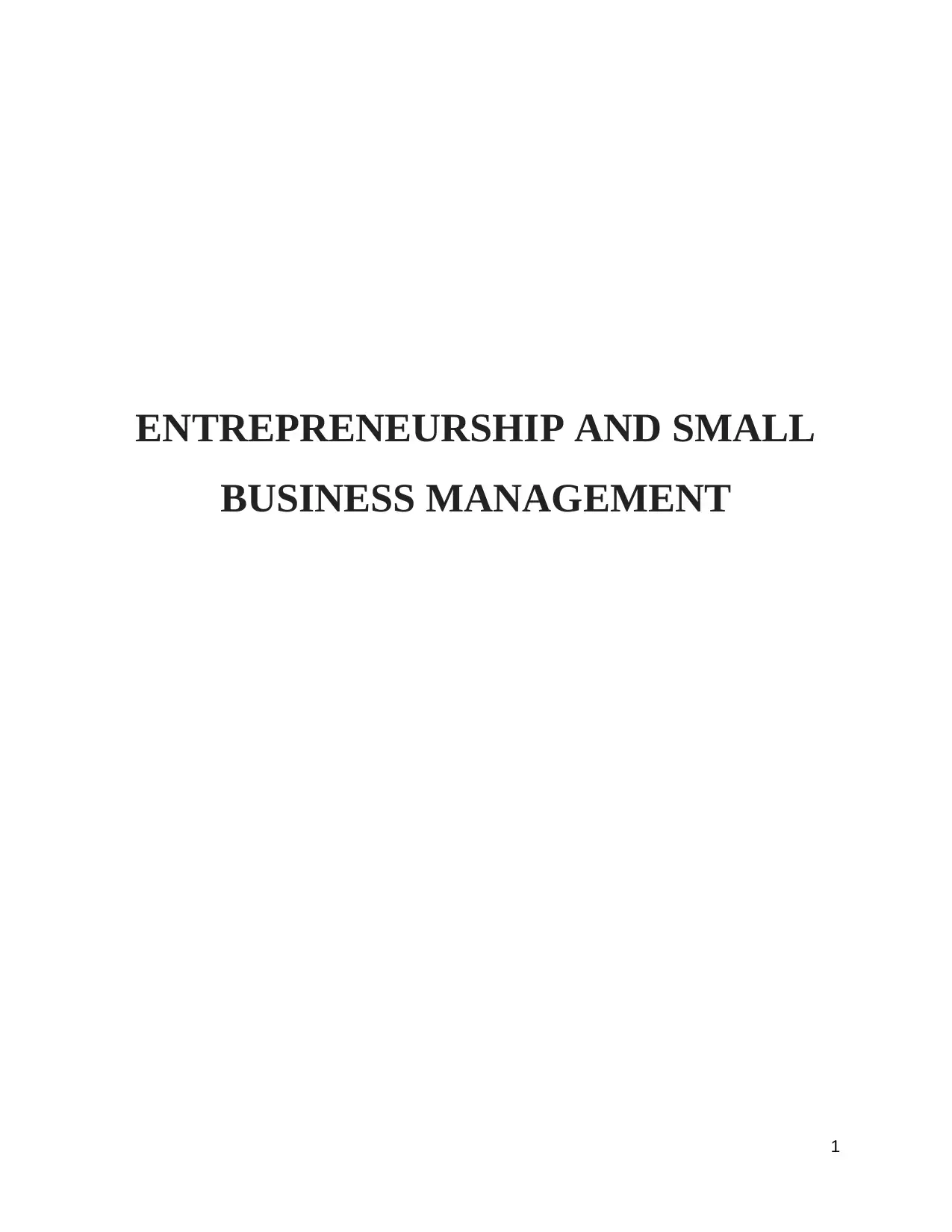
ENTREPRENEURSHIP AND SMALL
BUSINESS MANAGEMENT
1
BUSINESS MANAGEMENT
1
Paraphrase This Document
Need a fresh take? Get an instant paraphrase of this document with our AI Paraphraser
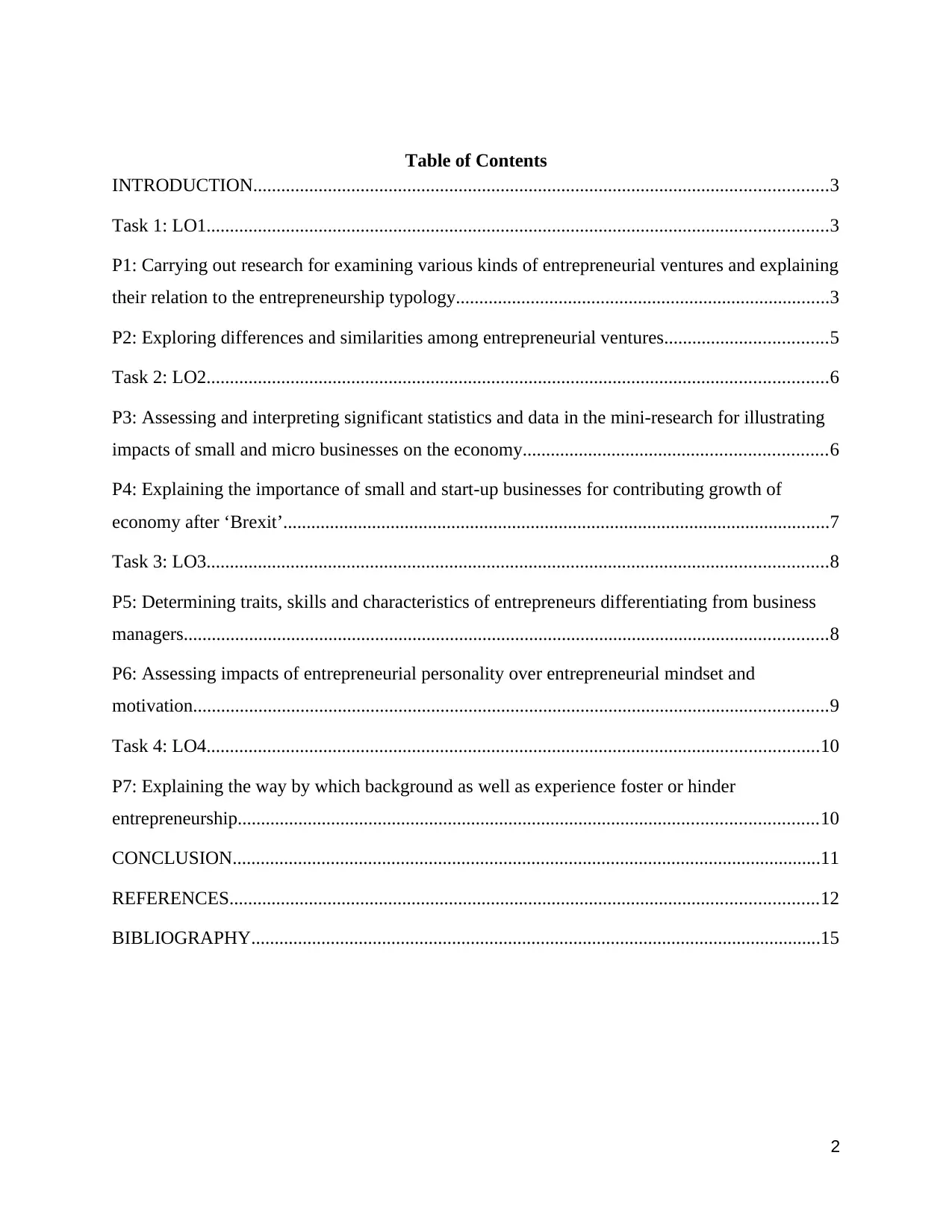
Table of Contents
INTRODUCTION...........................................................................................................................3
Task 1: LO1.....................................................................................................................................3
P1: Carrying out research for examining various kinds of entrepreneurial ventures and explaining
their relation to the entrepreneurship typology................................................................................3
P2: Exploring differences and similarities among entrepreneurial ventures...................................5
Task 2: LO2.....................................................................................................................................6
P3: Assessing and interpreting significant statistics and data in the mini-research for illustrating
impacts of small and micro businesses on the economy.................................................................6
P4: Explaining the importance of small and start-up businesses for contributing growth of
economy after ‘Brexit’.....................................................................................................................7
Task 3: LO3.....................................................................................................................................8
P5: Determining traits, skills and characteristics of entrepreneurs differentiating from business
managers..........................................................................................................................................8
P6: Assessing impacts of entrepreneurial personality over entrepreneurial mindset and
motivation........................................................................................................................................9
Task 4: LO4...................................................................................................................................10
P7: Explaining the way by which background as well as experience foster or hinder
entrepreneurship............................................................................................................................10
CONCLUSION..............................................................................................................................11
REFERENCES..............................................................................................................................12
BIBLIOGRAPHY..........................................................................................................................15
2
INTRODUCTION...........................................................................................................................3
Task 1: LO1.....................................................................................................................................3
P1: Carrying out research for examining various kinds of entrepreneurial ventures and explaining
their relation to the entrepreneurship typology................................................................................3
P2: Exploring differences and similarities among entrepreneurial ventures...................................5
Task 2: LO2.....................................................................................................................................6
P3: Assessing and interpreting significant statistics and data in the mini-research for illustrating
impacts of small and micro businesses on the economy.................................................................6
P4: Explaining the importance of small and start-up businesses for contributing growth of
economy after ‘Brexit’.....................................................................................................................7
Task 3: LO3.....................................................................................................................................8
P5: Determining traits, skills and characteristics of entrepreneurs differentiating from business
managers..........................................................................................................................................8
P6: Assessing impacts of entrepreneurial personality over entrepreneurial mindset and
motivation........................................................................................................................................9
Task 4: LO4...................................................................................................................................10
P7: Explaining the way by which background as well as experience foster or hinder
entrepreneurship............................................................................................................................10
CONCLUSION..............................................................................................................................11
REFERENCES..............................................................................................................................12
BIBLIOGRAPHY..........................................................................................................................15
2
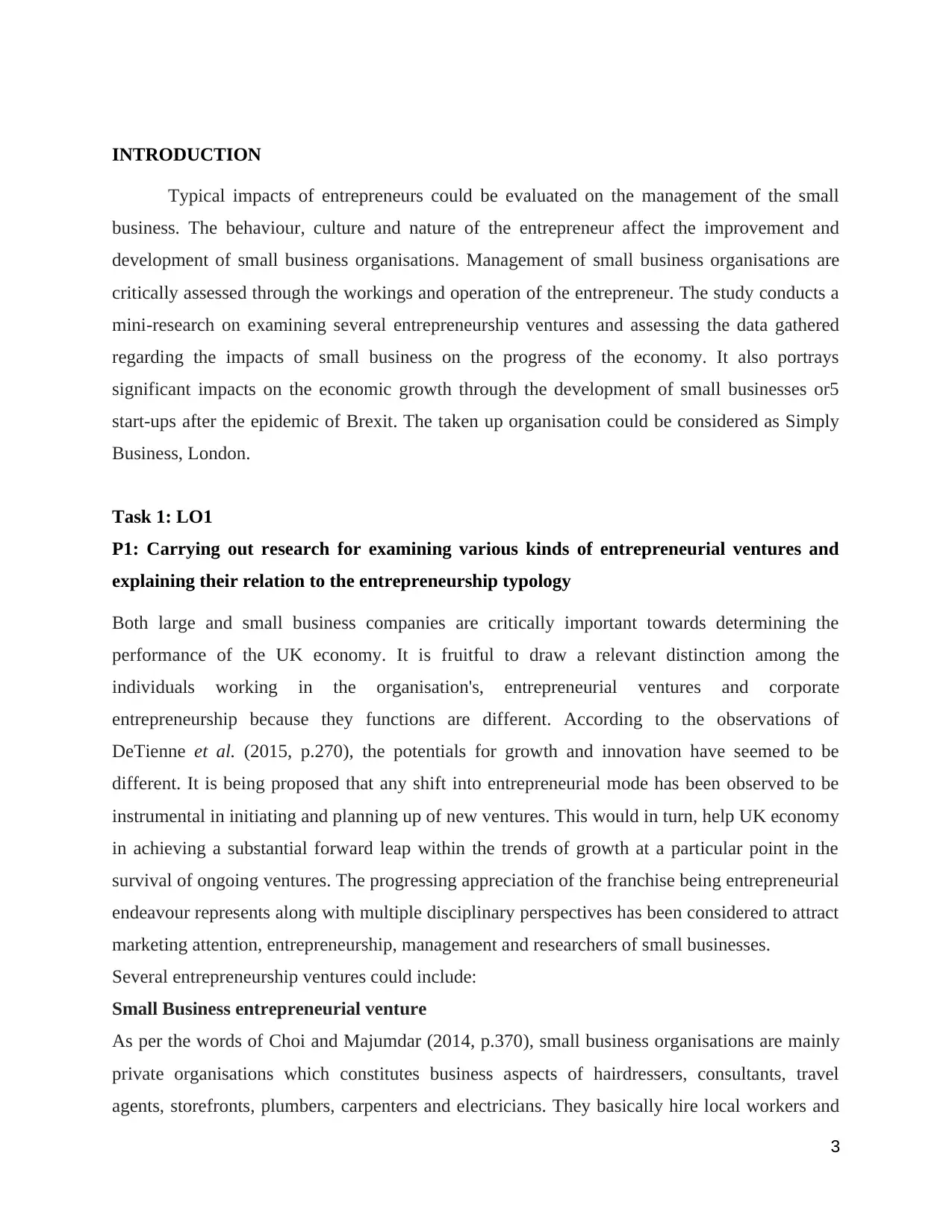
INTRODUCTION
Typical impacts of entrepreneurs could be evaluated on the management of the small
business. The behaviour, culture and nature of the entrepreneur affect the improvement and
development of small business organisations. Management of small business organisations are
critically assessed through the workings and operation of the entrepreneur. The study conducts a
mini-research on examining several entrepreneurship ventures and assessing the data gathered
regarding the impacts of small business on the progress of the economy. It also portrays
significant impacts on the economic growth through the development of small businesses or5
start-ups after the epidemic of Brexit. The taken up organisation could be considered as Simply
Business, London.
Task 1: LO1
P1: Carrying out research for examining various kinds of entrepreneurial ventures and
explaining their relation to the entrepreneurship typology
Both large and small business companies are critically important towards determining the
performance of the UK economy. It is fruitful to draw a relevant distinction among the
individuals working in the organisation's, entrepreneurial ventures and corporate
entrepreneurship because they functions are different. According to the observations of
DeTienne et al. (2015, p.270), the potentials for growth and innovation have seemed to be
different. It is being proposed that any shift into entrepreneurial mode has been observed to be
instrumental in initiating and planning up of new ventures. This would in turn, help UK economy
in achieving a substantial forward leap within the trends of growth at a particular point in the
survival of ongoing ventures. The progressing appreciation of the franchise being entrepreneurial
endeavour represents along with multiple disciplinary perspectives has been considered to attract
marketing attention, entrepreneurship, management and researchers of small businesses.
Several entrepreneurship ventures could include:
Small Business entrepreneurial venture
As per the words of Choi and Majumdar (2014, p.370), small business organisations are mainly
private organisations which constitutes business aspects of hairdressers, consultants, travel
agents, storefronts, plumbers, carpenters and electricians. They basically hire local workers and
3
Typical impacts of entrepreneurs could be evaluated on the management of the small
business. The behaviour, culture and nature of the entrepreneur affect the improvement and
development of small business organisations. Management of small business organisations are
critically assessed through the workings and operation of the entrepreneur. The study conducts a
mini-research on examining several entrepreneurship ventures and assessing the data gathered
regarding the impacts of small business on the progress of the economy. It also portrays
significant impacts on the economic growth through the development of small businesses or5
start-ups after the epidemic of Brexit. The taken up organisation could be considered as Simply
Business, London.
Task 1: LO1
P1: Carrying out research for examining various kinds of entrepreneurial ventures and
explaining their relation to the entrepreneurship typology
Both large and small business companies are critically important towards determining the
performance of the UK economy. It is fruitful to draw a relevant distinction among the
individuals working in the organisation's, entrepreneurial ventures and corporate
entrepreneurship because they functions are different. According to the observations of
DeTienne et al. (2015, p.270), the potentials for growth and innovation have seemed to be
different. It is being proposed that any shift into entrepreneurial mode has been observed to be
instrumental in initiating and planning up of new ventures. This would in turn, help UK economy
in achieving a substantial forward leap within the trends of growth at a particular point in the
survival of ongoing ventures. The progressing appreciation of the franchise being entrepreneurial
endeavour represents along with multiple disciplinary perspectives has been considered to attract
marketing attention, entrepreneurship, management and researchers of small businesses.
Several entrepreneurship ventures could include:
Small Business entrepreneurial venture
As per the words of Choi and Majumdar (2014, p.370), small business organisations are mainly
private organisations which constitutes business aspects of hairdressers, consultants, travel
agents, storefronts, plumbers, carpenters and electricians. They basically hire local workers and
3
⊘ This is a preview!⊘
Do you want full access?
Subscribe today to unlock all pages.

Trusted by 1+ million students worldwide
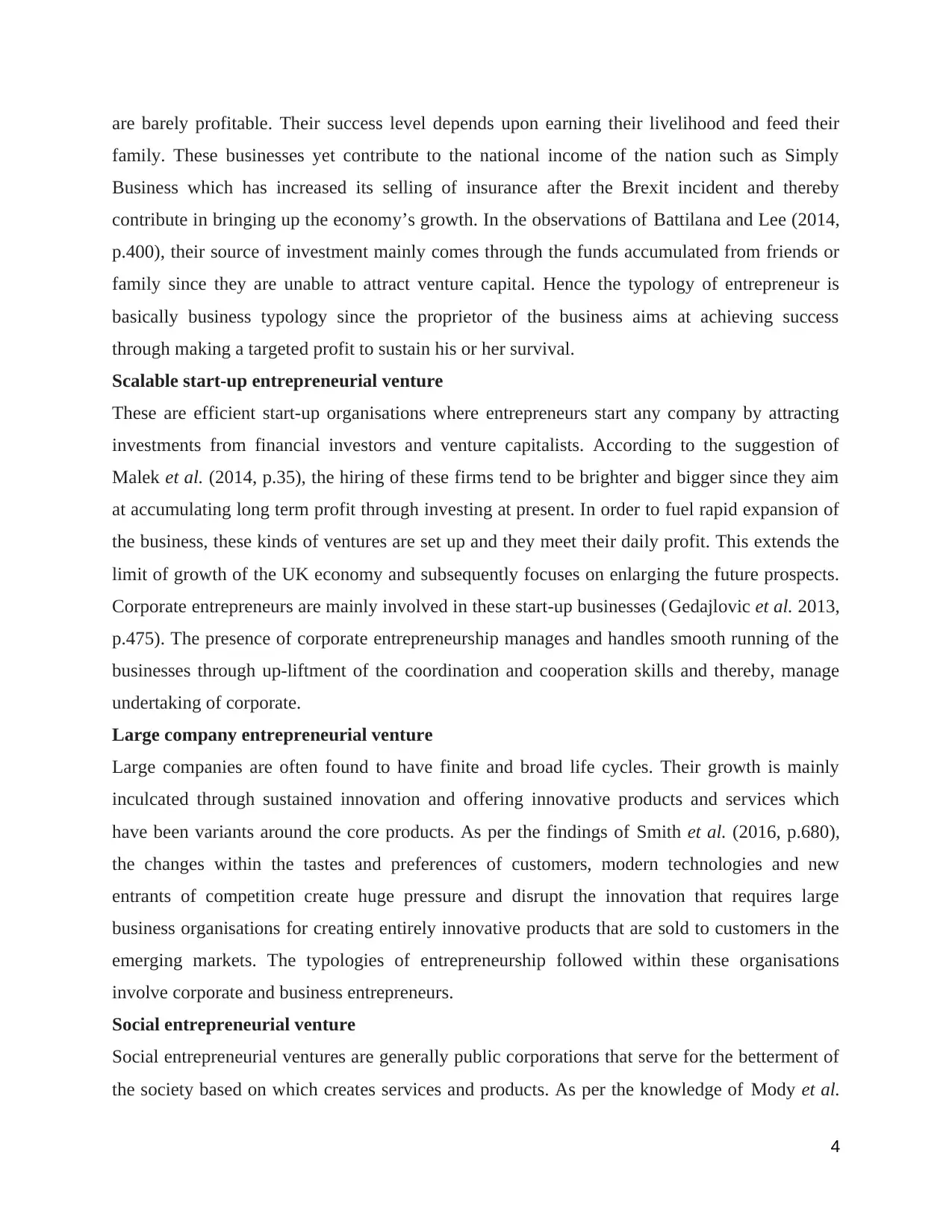
are barely profitable. Their success level depends upon earning their livelihood and feed their
family. These businesses yet contribute to the national income of the nation such as Simply
Business which has increased its selling of insurance after the Brexit incident and thereby
contribute in bringing up the economy’s growth. In the observations of Battilana and Lee (2014,
p.400), their source of investment mainly comes through the funds accumulated from friends or
family since they are unable to attract venture capital. Hence the typology of entrepreneur is
basically business typology since the proprietor of the business aims at achieving success
through making a targeted profit to sustain his or her survival.
Scalable start-up entrepreneurial venture
These are efficient start-up organisations where entrepreneurs start any company by attracting
investments from financial investors and venture capitalists. According to the suggestion of
Malek et al. (2014, p.35), the hiring of these firms tend to be brighter and bigger since they aim
at accumulating long term profit through investing at present. In order to fuel rapid expansion of
the business, these kinds of ventures are set up and they meet their daily profit. This extends the
limit of growth of the UK economy and subsequently focuses on enlarging the future prospects.
Corporate entrepreneurs are mainly involved in these start-up businesses (Gedajlovic et al. 2013,
p.475). The presence of corporate entrepreneurship manages and handles smooth running of the
businesses through up-liftment of the coordination and cooperation skills and thereby, manage
undertaking of corporate.
Large company entrepreneurial venture
Large companies are often found to have finite and broad life cycles. Their growth is mainly
inculcated through sustained innovation and offering innovative products and services which
have been variants around the core products. As per the findings of Smith et al. (2016, p.680),
the changes within the tastes and preferences of customers, modern technologies and new
entrants of competition create huge pressure and disrupt the innovation that requires large
business organisations for creating entirely innovative products that are sold to customers in the
emerging markets. The typologies of entrepreneurship followed within these organisations
involve corporate and business entrepreneurs.
Social entrepreneurial venture
Social entrepreneurial ventures are generally public corporations that serve for the betterment of
the society based on which creates services and products. As per the knowledge of Mody et al.
4
family. These businesses yet contribute to the national income of the nation such as Simply
Business which has increased its selling of insurance after the Brexit incident and thereby
contribute in bringing up the economy’s growth. In the observations of Battilana and Lee (2014,
p.400), their source of investment mainly comes through the funds accumulated from friends or
family since they are unable to attract venture capital. Hence the typology of entrepreneur is
basically business typology since the proprietor of the business aims at achieving success
through making a targeted profit to sustain his or her survival.
Scalable start-up entrepreneurial venture
These are efficient start-up organisations where entrepreneurs start any company by attracting
investments from financial investors and venture capitalists. According to the suggestion of
Malek et al. (2014, p.35), the hiring of these firms tend to be brighter and bigger since they aim
at accumulating long term profit through investing at present. In order to fuel rapid expansion of
the business, these kinds of ventures are set up and they meet their daily profit. This extends the
limit of growth of the UK economy and subsequently focuses on enlarging the future prospects.
Corporate entrepreneurs are mainly involved in these start-up businesses (Gedajlovic et al. 2013,
p.475). The presence of corporate entrepreneurship manages and handles smooth running of the
businesses through up-liftment of the coordination and cooperation skills and thereby, manage
undertaking of corporate.
Large company entrepreneurial venture
Large companies are often found to have finite and broad life cycles. Their growth is mainly
inculcated through sustained innovation and offering innovative products and services which
have been variants around the core products. As per the findings of Smith et al. (2016, p.680),
the changes within the tastes and preferences of customers, modern technologies and new
entrants of competition create huge pressure and disrupt the innovation that requires large
business organisations for creating entirely innovative products that are sold to customers in the
emerging markets. The typologies of entrepreneurship followed within these organisations
involve corporate and business entrepreneurs.
Social entrepreneurial venture
Social entrepreneurial ventures are generally public corporations that serve for the betterment of
the society based on which creates services and products. As per the knowledge of Mody et al.
4
Paraphrase This Document
Need a fresh take? Get an instant paraphrase of this document with our AI Paraphraser
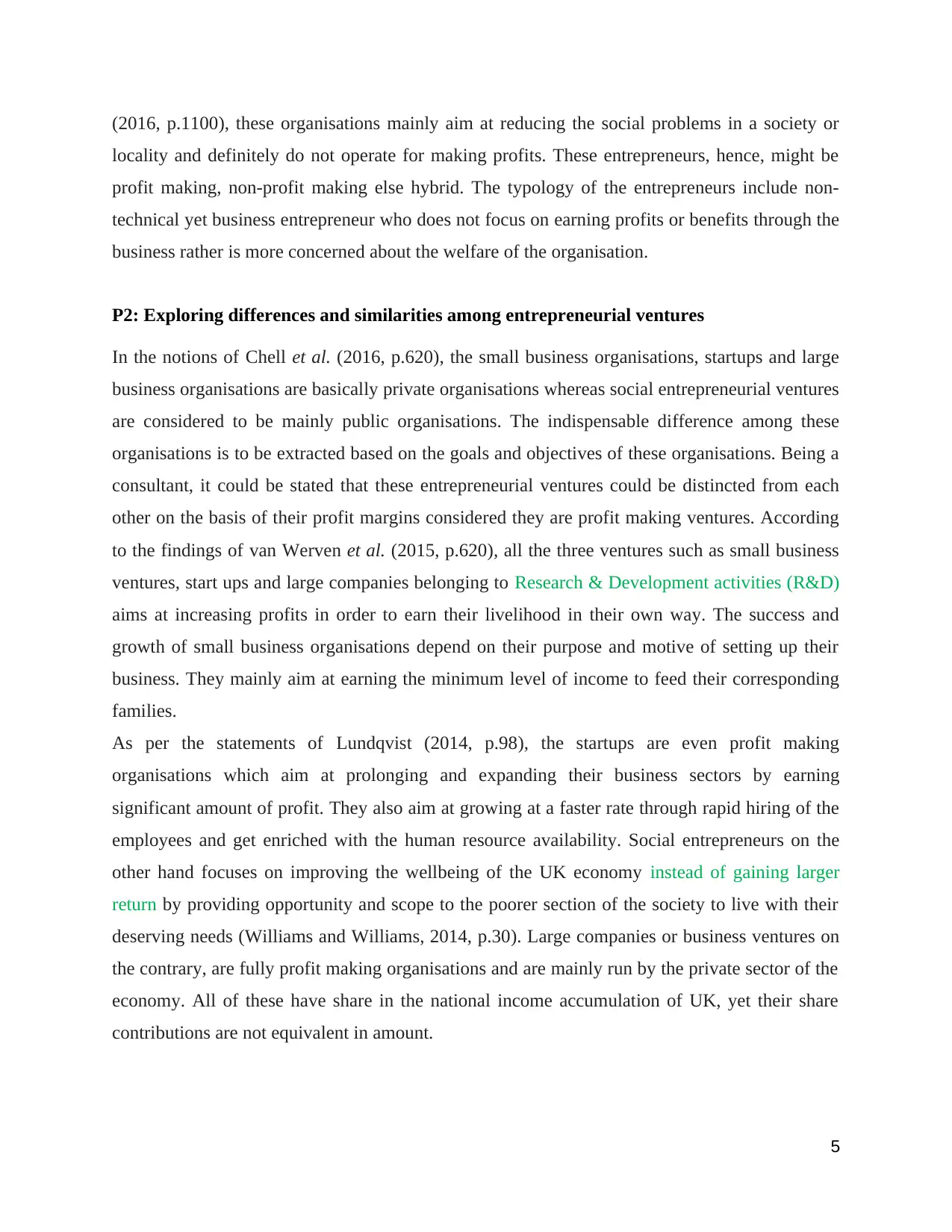
(2016, p.1100), these organisations mainly aim at reducing the social problems in a society or
locality and definitely do not operate for making profits. These entrepreneurs, hence, might be
profit making, non-profit making else hybrid. The typology of the entrepreneurs include non-
technical yet business entrepreneur who does not focus on earning profits or benefits through the
business rather is more concerned about the welfare of the organisation.
P2: Exploring differences and similarities among entrepreneurial ventures
In the notions of Chell et al. (2016, p.620), the small business organisations, startups and large
business organisations are basically private organisations whereas social entrepreneurial ventures
are considered to be mainly public organisations. The indispensable difference among these
organisations is to be extracted based on the goals and objectives of these organisations. Being a
consultant, it could be stated that these entrepreneurial ventures could be distincted from each
other on the basis of their profit margins considered they are profit making ventures. According
to the findings of van Werven et al. (2015, p.620), all the three ventures such as small business
ventures, start ups and large companies belonging to Research & Development activities (R&D)
aims at increasing profits in order to earn their livelihood in their own way. The success and
growth of small business organisations depend on their purpose and motive of setting up their
business. They mainly aim at earning the minimum level of income to feed their corresponding
families.
As per the statements of Lundqvist (2014, p.98), the startups are even profit making
organisations which aim at prolonging and expanding their business sectors by earning
significant amount of profit. They also aim at growing at a faster rate through rapid hiring of the
employees and get enriched with the human resource availability. Social entrepreneurs on the
other hand focuses on improving the wellbeing of the UK economy instead of gaining larger
return by providing opportunity and scope to the poorer section of the society to live with their
deserving needs (Williams and Williams, 2014, p.30). Large companies or business ventures on
the contrary, are fully profit making organisations and are mainly run by the private sector of the
economy. All of these have share in the national income accumulation of UK, yet their share
contributions are not equivalent in amount.
5
locality and definitely do not operate for making profits. These entrepreneurs, hence, might be
profit making, non-profit making else hybrid. The typology of the entrepreneurs include non-
technical yet business entrepreneur who does not focus on earning profits or benefits through the
business rather is more concerned about the welfare of the organisation.
P2: Exploring differences and similarities among entrepreneurial ventures
In the notions of Chell et al. (2016, p.620), the small business organisations, startups and large
business organisations are basically private organisations whereas social entrepreneurial ventures
are considered to be mainly public organisations. The indispensable difference among these
organisations is to be extracted based on the goals and objectives of these organisations. Being a
consultant, it could be stated that these entrepreneurial ventures could be distincted from each
other on the basis of their profit margins considered they are profit making ventures. According
to the findings of van Werven et al. (2015, p.620), all the three ventures such as small business
ventures, start ups and large companies belonging to Research & Development activities (R&D)
aims at increasing profits in order to earn their livelihood in their own way. The success and
growth of small business organisations depend on their purpose and motive of setting up their
business. They mainly aim at earning the minimum level of income to feed their corresponding
families.
As per the statements of Lundqvist (2014, p.98), the startups are even profit making
organisations which aim at prolonging and expanding their business sectors by earning
significant amount of profit. They also aim at growing at a faster rate through rapid hiring of the
employees and get enriched with the human resource availability. Social entrepreneurs on the
other hand focuses on improving the wellbeing of the UK economy instead of gaining larger
return by providing opportunity and scope to the poorer section of the society to live with their
deserving needs (Williams and Williams, 2014, p.30). Large companies or business ventures on
the contrary, are fully profit making organisations and are mainly run by the private sector of the
economy. All of these have share in the national income accumulation of UK, yet their share
contributions are not equivalent in amount.
5
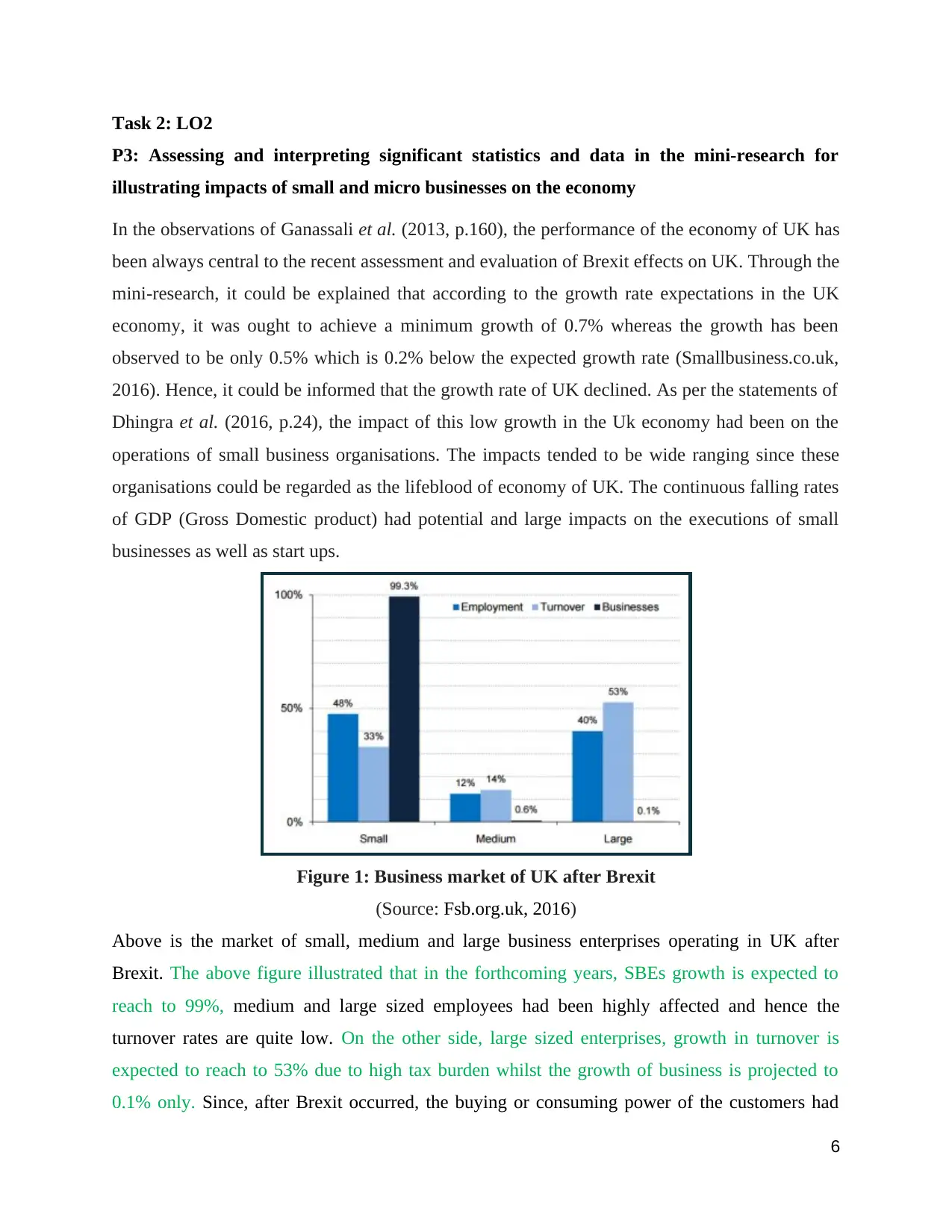
Task 2: LO2
P3: Assessing and interpreting significant statistics and data in the mini-research for
illustrating impacts of small and micro businesses on the economy
In the observations of Ganassali et al. (2013, p.160), the performance of the economy of UK has
been always central to the recent assessment and evaluation of Brexit effects on UK. Through the
mini-research, it could be explained that according to the growth rate expectations in the UK
economy, it was ought to achieve a minimum growth of 0.7% whereas the growth has been
observed to be only 0.5% which is 0.2% below the expected growth rate (Smallbusiness.co.uk,
2016). Hence, it could be informed that the growth rate of UK declined. As per the statements of
Dhingra et al. (2016, p.24), the impact of this low growth in the Uk economy had been on the
operations of small business organisations. The impacts tended to be wide ranging since these
organisations could be regarded as the lifeblood of economy of UK. The continuous falling rates
of GDP (Gross Domestic product) had potential and large impacts on the executions of small
businesses as well as start ups.
Figure 1: Business market of UK after Brexit
(Source: Fsb.org.uk, 2016)
Above is the market of small, medium and large business enterprises operating in UK after
Brexit. The above figure illustrated that in the forthcoming years, SBEs growth is expected to
reach to 99%, medium and large sized employees had been highly affected and hence the
turnover rates are quite low. On the other side, large sized enterprises, growth in turnover is
expected to reach to 53% due to high tax burden whilst the growth of business is projected to
0.1% only. Since, after Brexit occurred, the buying or consuming power of the customers had
6
P3: Assessing and interpreting significant statistics and data in the mini-research for
illustrating impacts of small and micro businesses on the economy
In the observations of Ganassali et al. (2013, p.160), the performance of the economy of UK has
been always central to the recent assessment and evaluation of Brexit effects on UK. Through the
mini-research, it could be explained that according to the growth rate expectations in the UK
economy, it was ought to achieve a minimum growth of 0.7% whereas the growth has been
observed to be only 0.5% which is 0.2% below the expected growth rate (Smallbusiness.co.uk,
2016). Hence, it could be informed that the growth rate of UK declined. As per the statements of
Dhingra et al. (2016, p.24), the impact of this low growth in the Uk economy had been on the
operations of small business organisations. The impacts tended to be wide ranging since these
organisations could be regarded as the lifeblood of economy of UK. The continuous falling rates
of GDP (Gross Domestic product) had potential and large impacts on the executions of small
businesses as well as start ups.
Figure 1: Business market of UK after Brexit
(Source: Fsb.org.uk, 2016)
Above is the market of small, medium and large business enterprises operating in UK after
Brexit. The above figure illustrated that in the forthcoming years, SBEs growth is expected to
reach to 99%, medium and large sized employees had been highly affected and hence the
turnover rates are quite low. On the other side, large sized enterprises, growth in turnover is
expected to reach to 53% due to high tax burden whilst the growth of business is projected to
0.1% only. Since, after Brexit occurred, the buying or consuming power of the customers had
6
⊘ This is a preview!⊘
Do you want full access?
Subscribe today to unlock all pages.

Trusted by 1+ million students worldwide
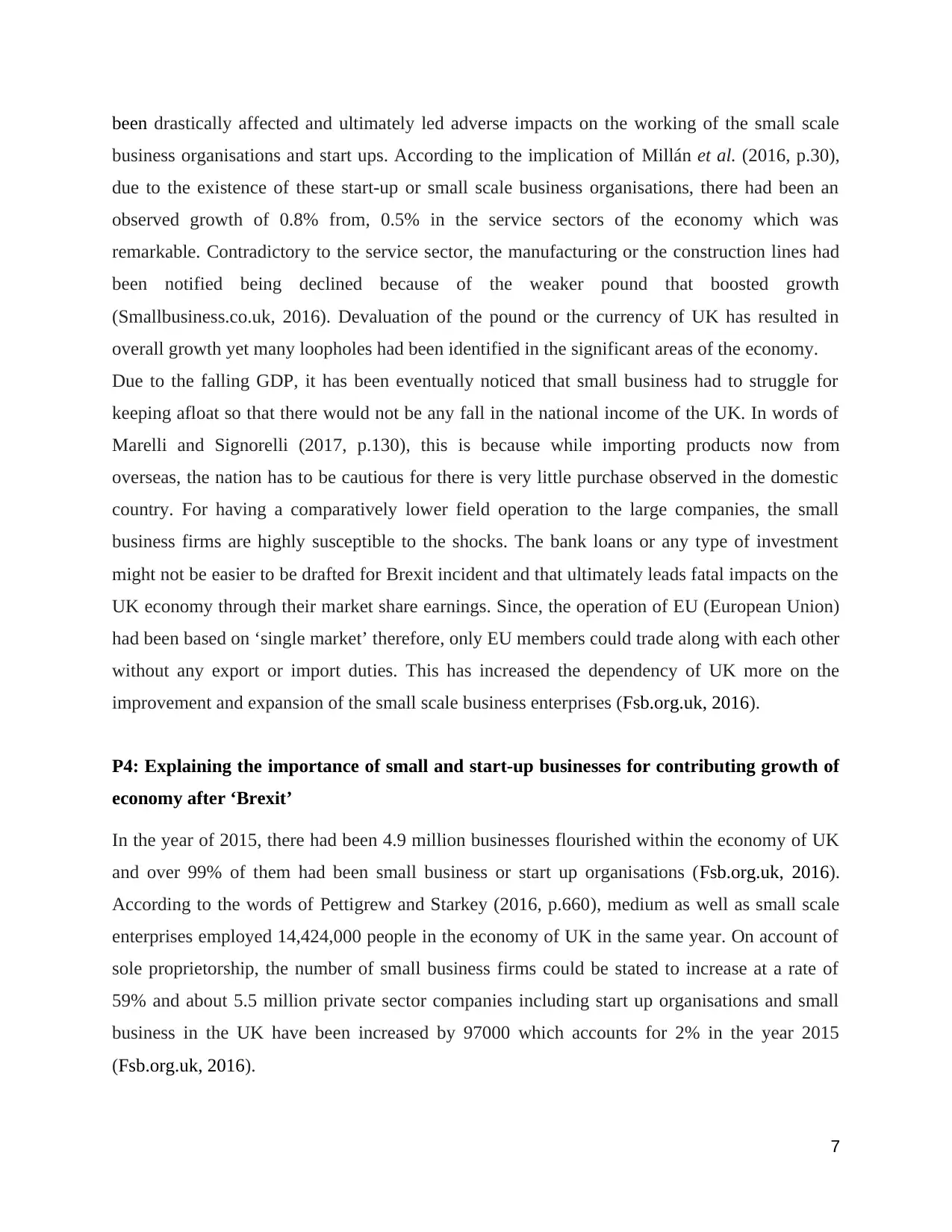
been drastically affected and ultimately led adverse impacts on the working of the small scale
business organisations and start ups. According to the implication of Millán et al. (2016, p.30),
due to the existence of these start-up or small scale business organisations, there had been an
observed growth of 0.8% from, 0.5% in the service sectors of the economy which was
remarkable. Contradictory to the service sector, the manufacturing or the construction lines had
been notified being declined because of the weaker pound that boosted growth
(Smallbusiness.co.uk, 2016). Devaluation of the pound or the currency of UK has resulted in
overall growth yet many loopholes had been identified in the significant areas of the economy.
Due to the falling GDP, it has been eventually noticed that small business had to struggle for
keeping afloat so that there would not be any fall in the national income of the UK. In words of
Marelli and Signorelli (2017, p.130), this is because while importing products now from
overseas, the nation has to be cautious for there is very little purchase observed in the domestic
country. For having a comparatively lower field operation to the large companies, the small
business firms are highly susceptible to the shocks. The bank loans or any type of investment
might not be easier to be drafted for Brexit incident and that ultimately leads fatal impacts on the
UK economy through their market share earnings. Since, the operation of EU (European Union)
had been based on ‘single market’ therefore, only EU members could trade along with each other
without any export or import duties. This has increased the dependency of UK more on the
improvement and expansion of the small scale business enterprises (Fsb.org.uk, 2016).
P4: Explaining the importance of small and start-up businesses for contributing growth of
economy after ‘Brexit’
In the year of 2015, there had been 4.9 million businesses flourished within the economy of UK
and over 99% of them had been small business or start up organisations (Fsb.org.uk, 2016).
According to the words of Pettigrew and Starkey (2016, p.660), medium as well as small scale
enterprises employed 14,424,000 people in the economy of UK in the same year. On account of
sole proprietorship, the number of small business firms could be stated to increase at a rate of
59% and about 5.5 million private sector companies including start up organisations and small
business in the UK have been increased by 97000 which accounts for 2% in the year 2015
(Fsb.org.uk, 2016).
7
business organisations and start ups. According to the implication of Millán et al. (2016, p.30),
due to the existence of these start-up or small scale business organisations, there had been an
observed growth of 0.8% from, 0.5% in the service sectors of the economy which was
remarkable. Contradictory to the service sector, the manufacturing or the construction lines had
been notified being declined because of the weaker pound that boosted growth
(Smallbusiness.co.uk, 2016). Devaluation of the pound or the currency of UK has resulted in
overall growth yet many loopholes had been identified in the significant areas of the economy.
Due to the falling GDP, it has been eventually noticed that small business had to struggle for
keeping afloat so that there would not be any fall in the national income of the UK. In words of
Marelli and Signorelli (2017, p.130), this is because while importing products now from
overseas, the nation has to be cautious for there is very little purchase observed in the domestic
country. For having a comparatively lower field operation to the large companies, the small
business firms are highly susceptible to the shocks. The bank loans or any type of investment
might not be easier to be drafted for Brexit incident and that ultimately leads fatal impacts on the
UK economy through their market share earnings. Since, the operation of EU (European Union)
had been based on ‘single market’ therefore, only EU members could trade along with each other
without any export or import duties. This has increased the dependency of UK more on the
improvement and expansion of the small scale business enterprises (Fsb.org.uk, 2016).
P4: Explaining the importance of small and start-up businesses for contributing growth of
economy after ‘Brexit’
In the year of 2015, there had been 4.9 million businesses flourished within the economy of UK
and over 99% of them had been small business or start up organisations (Fsb.org.uk, 2016).
According to the words of Pettigrew and Starkey (2016, p.660), medium as well as small scale
enterprises employed 14,424,000 people in the economy of UK in the same year. On account of
sole proprietorship, the number of small business firms could be stated to increase at a rate of
59% and about 5.5 million private sector companies including start up organisations and small
business in the UK have been increased by 97000 which accounts for 2% in the year 2015
(Fsb.org.uk, 2016).
7
Paraphrase This Document
Need a fresh take? Get an instant paraphrase of this document with our AI Paraphraser
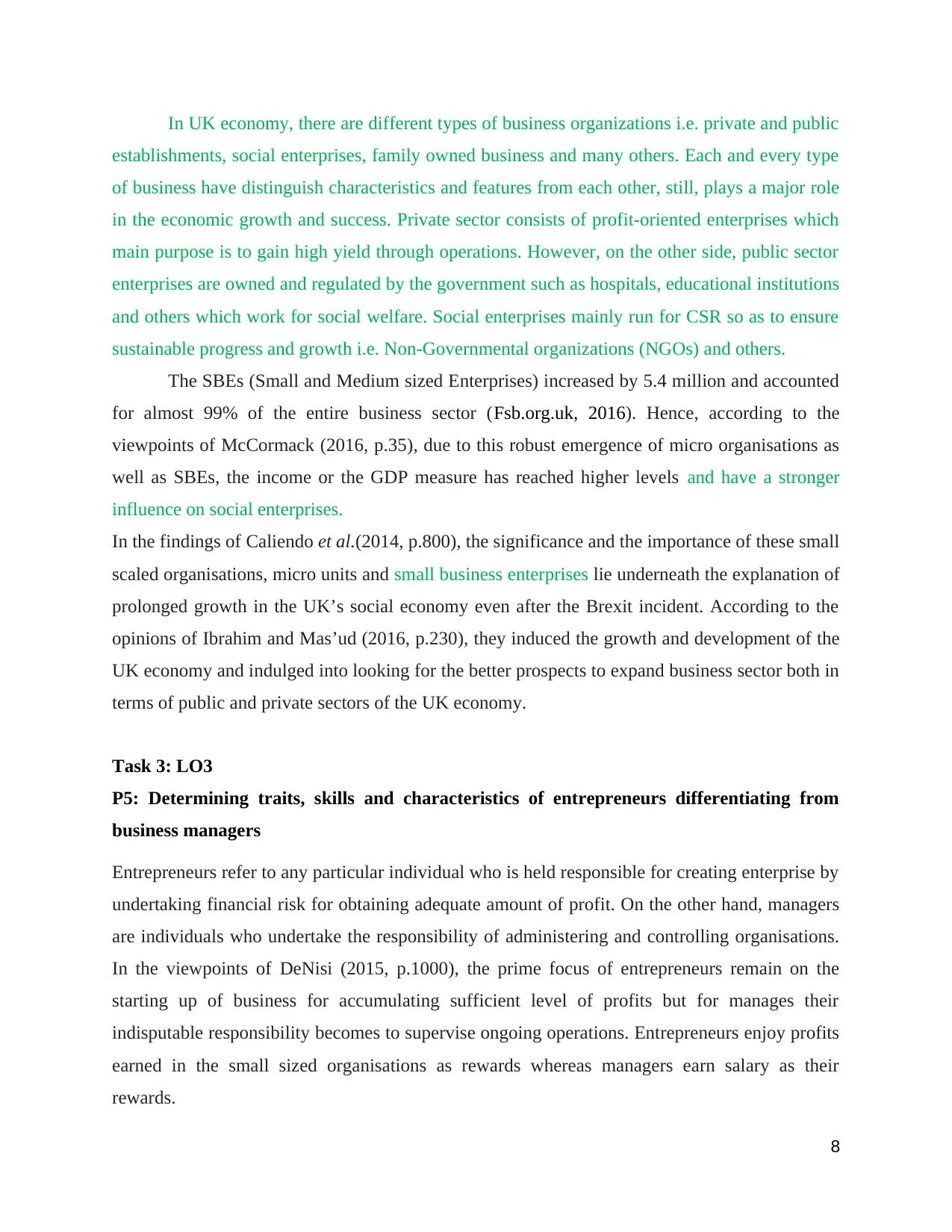
In UK economy, there are different types of business organizations i.e. private and public
establishments, social enterprises, family owned business and many others. Each and every type
of business have distinguish characteristics and features from each other, still, plays a major role
in the economic growth and success. Private sector consists of profit-oriented enterprises which
main purpose is to gain high yield through operations. However, on the other side, public sector
enterprises are owned and regulated by the government such as hospitals, educational institutions
and others which work for social welfare. Social enterprises mainly run for CSR so as to ensure
sustainable progress and growth i.e. Non-Governmental organizations (NGOs) and others.
The SBEs (Small and Medium sized Enterprises) increased by 5.4 million and accounted
for almost 99% of the entire business sector (Fsb.org.uk, 2016). Hence, according to the
viewpoints of McCormack (2016, p.35), due to this robust emergence of micro organisations as
well as SBEs, the income or the GDP measure has reached higher levels and have a stronger
influence on social enterprises.
In the findings of Caliendo et al.(2014, p.800), the significance and the importance of these small
scaled organisations, micro units and small business enterprises lie underneath the explanation of
prolonged growth in the UK’s social economy even after the Brexit incident. According to the
opinions of Ibrahim and Mas’ud (2016, p.230), they induced the growth and development of the
UK economy and indulged into looking for the better prospects to expand business sector both in
terms of public and private sectors of the UK economy.
Task 3: LO3
P5: Determining traits, skills and characteristics of entrepreneurs differentiating from
business managers
Entrepreneurs refer to any particular individual who is held responsible for creating enterprise by
undertaking financial risk for obtaining adequate amount of profit. On the other hand, managers
are individuals who undertake the responsibility of administering and controlling organisations.
In the viewpoints of DeNisi (2015, p.1000), the prime focus of entrepreneurs remain on the
starting up of business for accumulating sufficient level of profits but for manages their
indisputable responsibility becomes to supervise ongoing operations. Entrepreneurs enjoy profits
earned in the small sized organisations as rewards whereas managers earn salary as their
rewards.
8
establishments, social enterprises, family owned business and many others. Each and every type
of business have distinguish characteristics and features from each other, still, plays a major role
in the economic growth and success. Private sector consists of profit-oriented enterprises which
main purpose is to gain high yield through operations. However, on the other side, public sector
enterprises are owned and regulated by the government such as hospitals, educational institutions
and others which work for social welfare. Social enterprises mainly run for CSR so as to ensure
sustainable progress and growth i.e. Non-Governmental organizations (NGOs) and others.
The SBEs (Small and Medium sized Enterprises) increased by 5.4 million and accounted
for almost 99% of the entire business sector (Fsb.org.uk, 2016). Hence, according to the
viewpoints of McCormack (2016, p.35), due to this robust emergence of micro organisations as
well as SBEs, the income or the GDP measure has reached higher levels and have a stronger
influence on social enterprises.
In the findings of Caliendo et al.(2014, p.800), the significance and the importance of these small
scaled organisations, micro units and small business enterprises lie underneath the explanation of
prolonged growth in the UK’s social economy even after the Brexit incident. According to the
opinions of Ibrahim and Mas’ud (2016, p.230), they induced the growth and development of the
UK economy and indulged into looking for the better prospects to expand business sector both in
terms of public and private sectors of the UK economy.
Task 3: LO3
P5: Determining traits, skills and characteristics of entrepreneurs differentiating from
business managers
Entrepreneurs refer to any particular individual who is held responsible for creating enterprise by
undertaking financial risk for obtaining adequate amount of profit. On the other hand, managers
are individuals who undertake the responsibility of administering and controlling organisations.
In the viewpoints of DeNisi (2015, p.1000), the prime focus of entrepreneurs remain on the
starting up of business for accumulating sufficient level of profits but for manages their
indisputable responsibility becomes to supervise ongoing operations. Entrepreneurs enjoy profits
earned in the small sized organisations as rewards whereas managers earn salary as their
rewards.
8
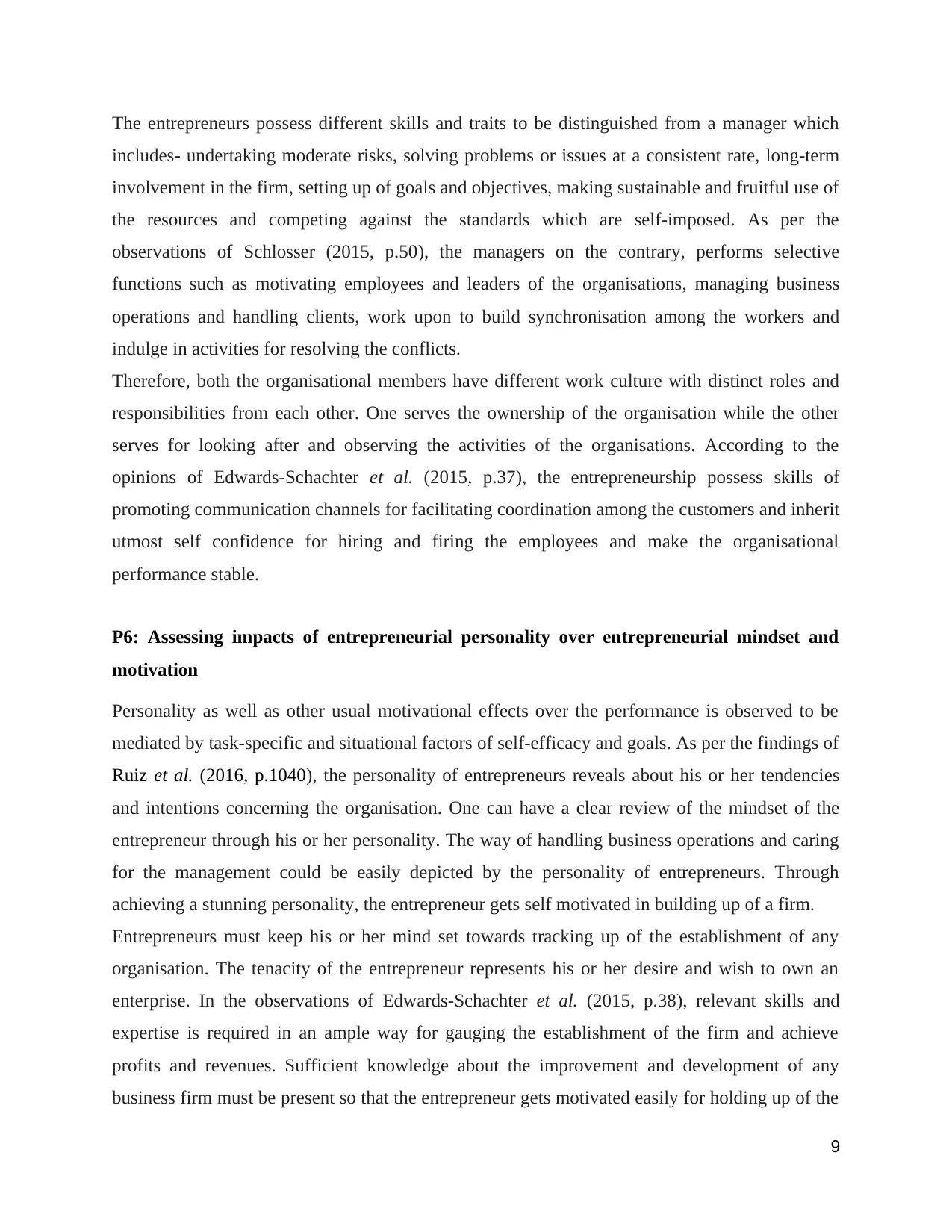
The entrepreneurs possess different skills and traits to be distinguished from a manager which
includes- undertaking moderate risks, solving problems or issues at a consistent rate, long-term
involvement in the firm, setting up of goals and objectives, making sustainable and fruitful use of
the resources and competing against the standards which are self-imposed. As per the
observations of Schlosser (2015, p.50), the managers on the contrary, performs selective
functions such as motivating employees and leaders of the organisations, managing business
operations and handling clients, work upon to build synchronisation among the workers and
indulge in activities for resolving the conflicts.
Therefore, both the organisational members have different work culture with distinct roles and
responsibilities from each other. One serves the ownership of the organisation while the other
serves for looking after and observing the activities of the organisations. According to the
opinions of Edwards-Schachter et al. (2015, p.37), the entrepreneurship possess skills of
promoting communication channels for facilitating coordination among the customers and inherit
utmost self confidence for hiring and firing the employees and make the organisational
performance stable.
P6: Assessing impacts of entrepreneurial personality over entrepreneurial mindset and
motivation
Personality as well as other usual motivational effects over the performance is observed to be
mediated by task-specific and situational factors of self-efficacy and goals. As per the findings of
Ruiz et al. (2016, p.1040), the personality of entrepreneurs reveals about his or her tendencies
and intentions concerning the organisation. One can have a clear review of the mindset of the
entrepreneur through his or her personality. The way of handling business operations and caring
for the management could be easily depicted by the personality of entrepreneurs. Through
achieving a stunning personality, the entrepreneur gets self motivated in building up of a firm.
Entrepreneurs must keep his or her mind set towards tracking up of the establishment of any
organisation. The tenacity of the entrepreneur represents his or her desire and wish to own an
enterprise. In the observations of Edwards-Schachter et al. (2015, p.38), relevant skills and
expertise is required in an ample way for gauging the establishment of the firm and achieve
profits and revenues. Sufficient knowledge about the improvement and development of any
business firm must be present so that the entrepreneur gets motivated easily for holding up of the
9
includes- undertaking moderate risks, solving problems or issues at a consistent rate, long-term
involvement in the firm, setting up of goals and objectives, making sustainable and fruitful use of
the resources and competing against the standards which are self-imposed. As per the
observations of Schlosser (2015, p.50), the managers on the contrary, performs selective
functions such as motivating employees and leaders of the organisations, managing business
operations and handling clients, work upon to build synchronisation among the workers and
indulge in activities for resolving the conflicts.
Therefore, both the organisational members have different work culture with distinct roles and
responsibilities from each other. One serves the ownership of the organisation while the other
serves for looking after and observing the activities of the organisations. According to the
opinions of Edwards-Schachter et al. (2015, p.37), the entrepreneurship possess skills of
promoting communication channels for facilitating coordination among the customers and inherit
utmost self confidence for hiring and firing the employees and make the organisational
performance stable.
P6: Assessing impacts of entrepreneurial personality over entrepreneurial mindset and
motivation
Personality as well as other usual motivational effects over the performance is observed to be
mediated by task-specific and situational factors of self-efficacy and goals. As per the findings of
Ruiz et al. (2016, p.1040), the personality of entrepreneurs reveals about his or her tendencies
and intentions concerning the organisation. One can have a clear review of the mindset of the
entrepreneur through his or her personality. The way of handling business operations and caring
for the management could be easily depicted by the personality of entrepreneurs. Through
achieving a stunning personality, the entrepreneur gets self motivated in building up of a firm.
Entrepreneurs must keep his or her mind set towards tracking up of the establishment of any
organisation. The tenacity of the entrepreneur represents his or her desire and wish to own an
enterprise. In the observations of Edwards-Schachter et al. (2015, p.38), relevant skills and
expertise is required in an ample way for gauging the establishment of the firm and achieve
profits and revenues. Sufficient knowledge about the improvement and development of any
business firm must be present so that the entrepreneur gets motivated easily for holding up of the
9
⊘ This is a preview!⊘
Do you want full access?
Subscribe today to unlock all pages.

Trusted by 1+ million students worldwide
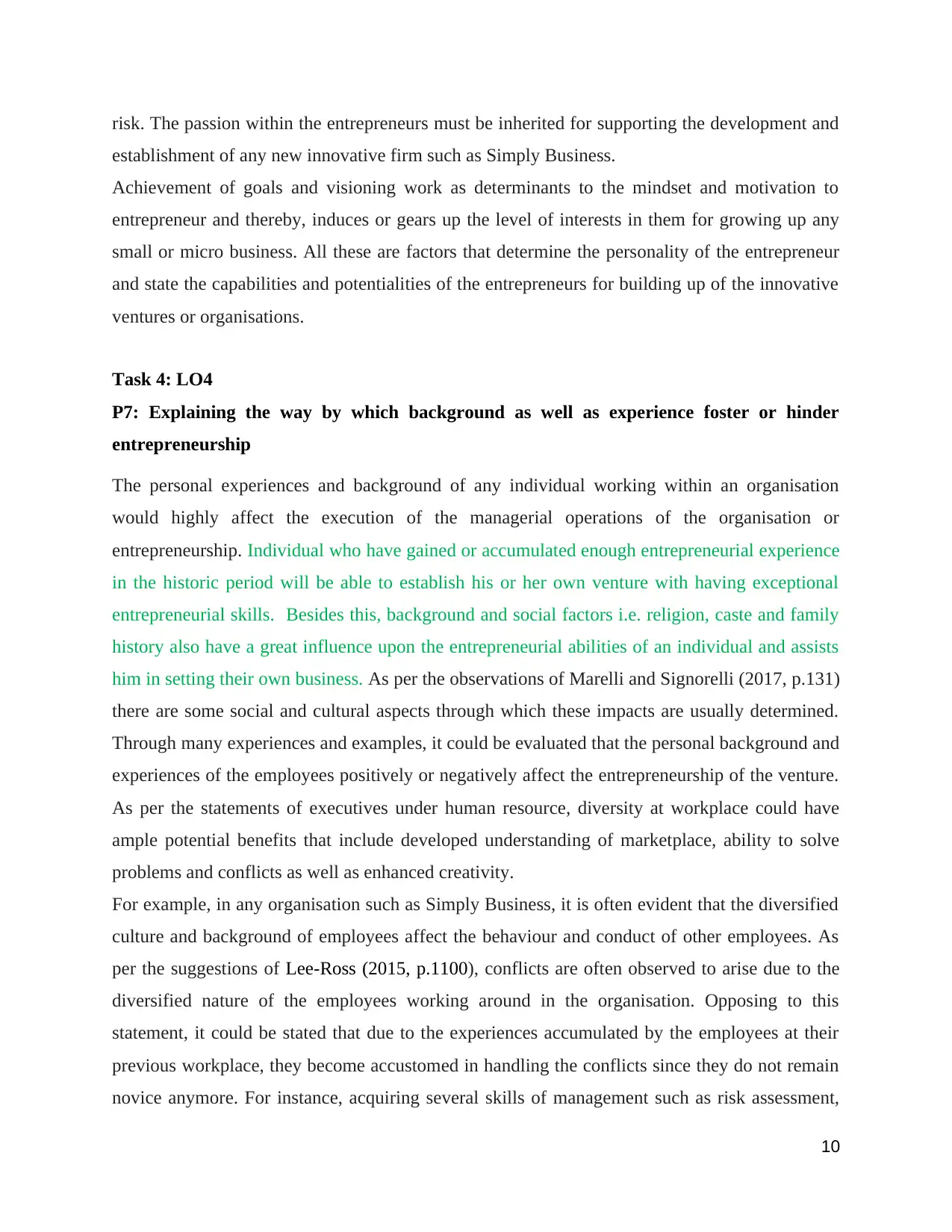
risk. The passion within the entrepreneurs must be inherited for supporting the development and
establishment of any new innovative firm such as Simply Business.
Achievement of goals and visioning work as determinants to the mindset and motivation to
entrepreneur and thereby, induces or gears up the level of interests in them for growing up any
small or micro business. All these are factors that determine the personality of the entrepreneur
and state the capabilities and potentialities of the entrepreneurs for building up of the innovative
ventures or organisations.
Task 4: LO4
P7: Explaining the way by which background as well as experience foster or hinder
entrepreneurship
The personal experiences and background of any individual working within an organisation
would highly affect the execution of the managerial operations of the organisation or
entrepreneurship. Individual who have gained or accumulated enough entrepreneurial experience
in the historic period will be able to establish his or her own venture with having exceptional
entrepreneurial skills. Besides this, background and social factors i.e. religion, caste and family
history also have a great influence upon the entrepreneurial abilities of an individual and assists
him in setting their own business. As per the observations of Marelli and Signorelli (2017, p.131)
there are some social and cultural aspects through which these impacts are usually determined.
Through many experiences and examples, it could be evaluated that the personal background and
experiences of the employees positively or negatively affect the entrepreneurship of the venture.
As per the statements of executives under human resource, diversity at workplace could have
ample potential benefits that include developed understanding of marketplace, ability to solve
problems and conflicts as well as enhanced creativity.
For example, in any organisation such as Simply Business, it is often evident that the diversified
culture and background of employees affect the behaviour and conduct of other employees. As
per the suggestions of Lee-Ross (2015, p.1100), conflicts are often observed to arise due to the
diversified nature of the employees working around in the organisation. Opposing to this
statement, it could be stated that due to the experiences accumulated by the employees at their
previous workplace, they become accustomed in handling the conflicts since they do not remain
novice anymore. For instance, acquiring several skills of management such as risk assessment,
10
establishment of any new innovative firm such as Simply Business.
Achievement of goals and visioning work as determinants to the mindset and motivation to
entrepreneur and thereby, induces or gears up the level of interests in them for growing up any
small or micro business. All these are factors that determine the personality of the entrepreneur
and state the capabilities and potentialities of the entrepreneurs for building up of the innovative
ventures or organisations.
Task 4: LO4
P7: Explaining the way by which background as well as experience foster or hinder
entrepreneurship
The personal experiences and background of any individual working within an organisation
would highly affect the execution of the managerial operations of the organisation or
entrepreneurship. Individual who have gained or accumulated enough entrepreneurial experience
in the historic period will be able to establish his or her own venture with having exceptional
entrepreneurial skills. Besides this, background and social factors i.e. religion, caste and family
history also have a great influence upon the entrepreneurial abilities of an individual and assists
him in setting their own business. As per the observations of Marelli and Signorelli (2017, p.131)
there are some social and cultural aspects through which these impacts are usually determined.
Through many experiences and examples, it could be evaluated that the personal background and
experiences of the employees positively or negatively affect the entrepreneurship of the venture.
As per the statements of executives under human resource, diversity at workplace could have
ample potential benefits that include developed understanding of marketplace, ability to solve
problems and conflicts as well as enhanced creativity.
For example, in any organisation such as Simply Business, it is often evident that the diversified
culture and background of employees affect the behaviour and conduct of other employees. As
per the suggestions of Lee-Ross (2015, p.1100), conflicts are often observed to arise due to the
diversified nature of the employees working around in the organisation. Opposing to this
statement, it could be stated that due to the experiences accumulated by the employees at their
previous workplace, they become accustomed in handling the conflicts since they do not remain
novice anymore. For instance, acquiring several skills of management such as risk assessment,
10
Paraphrase This Document
Need a fresh take? Get an instant paraphrase of this document with our AI Paraphraser
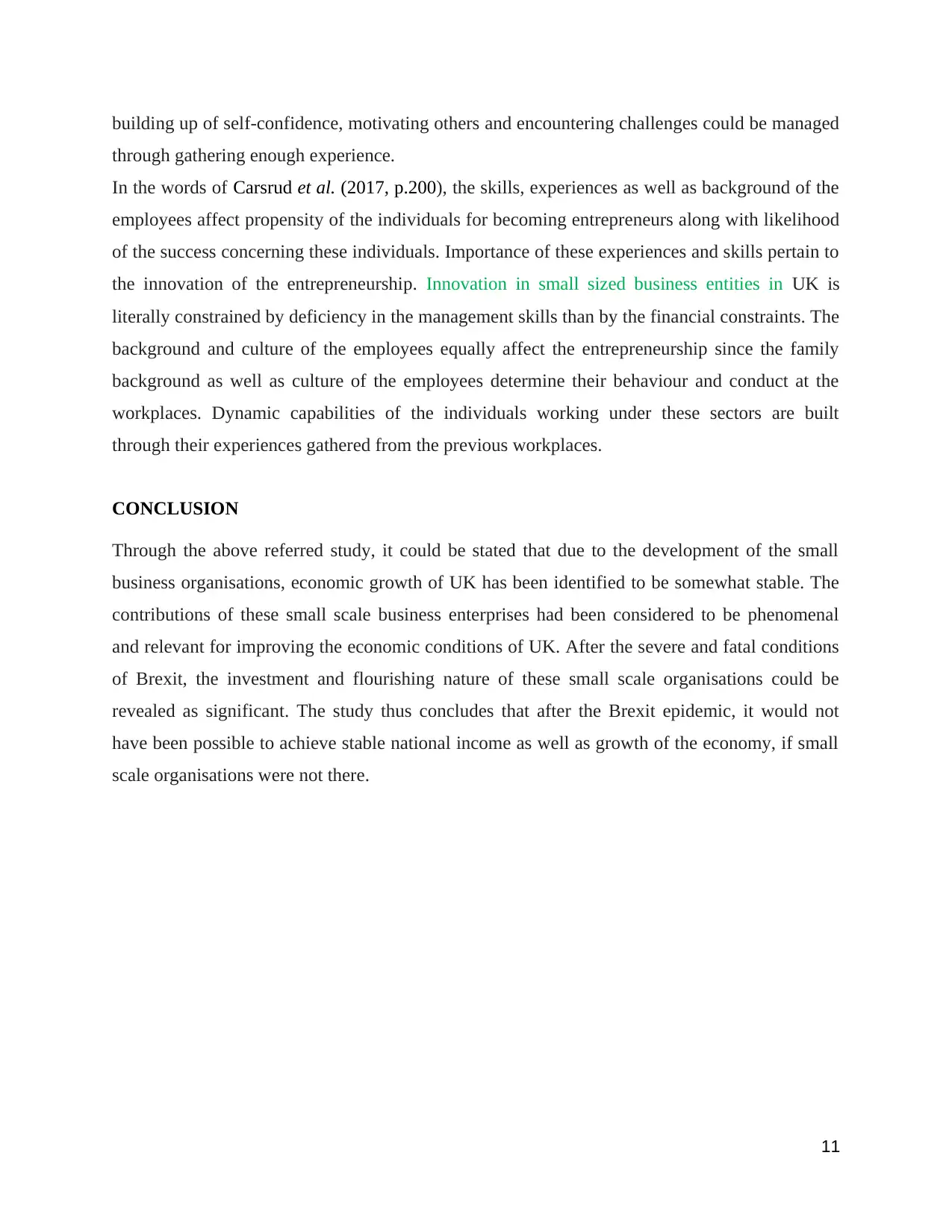
building up of self-confidence, motivating others and encountering challenges could be managed
through gathering enough experience.
In the words of Carsrud et al. (2017, p.200), the skills, experiences as well as background of the
employees affect propensity of the individuals for becoming entrepreneurs along with likelihood
of the success concerning these individuals. Importance of these experiences and skills pertain to
the innovation of the entrepreneurship. Innovation in small sized business entities in UK is
literally constrained by deficiency in the management skills than by the financial constraints. The
background and culture of the employees equally affect the entrepreneurship since the family
background as well as culture of the employees determine their behaviour and conduct at the
workplaces. Dynamic capabilities of the individuals working under these sectors are built
through their experiences gathered from the previous workplaces.
CONCLUSION
Through the above referred study, it could be stated that due to the development of the small
business organisations, economic growth of UK has been identified to be somewhat stable. The
contributions of these small scale business enterprises had been considered to be phenomenal
and relevant for improving the economic conditions of UK. After the severe and fatal conditions
of Brexit, the investment and flourishing nature of these small scale organisations could be
revealed as significant. The study thus concludes that after the Brexit epidemic, it would not
have been possible to achieve stable national income as well as growth of the economy, if small
scale organisations were not there.
11
through gathering enough experience.
In the words of Carsrud et al. (2017, p.200), the skills, experiences as well as background of the
employees affect propensity of the individuals for becoming entrepreneurs along with likelihood
of the success concerning these individuals. Importance of these experiences and skills pertain to
the innovation of the entrepreneurship. Innovation in small sized business entities in UK is
literally constrained by deficiency in the management skills than by the financial constraints. The
background and culture of the employees equally affect the entrepreneurship since the family
background as well as culture of the employees determine their behaviour and conduct at the
workplaces. Dynamic capabilities of the individuals working under these sectors are built
through their experiences gathered from the previous workplaces.
CONCLUSION
Through the above referred study, it could be stated that due to the development of the small
business organisations, economic growth of UK has been identified to be somewhat stable. The
contributions of these small scale business enterprises had been considered to be phenomenal
and relevant for improving the economic conditions of UK. After the severe and fatal conditions
of Brexit, the investment and flourishing nature of these small scale organisations could be
revealed as significant. The study thus concludes that after the Brexit epidemic, it would not
have been possible to achieve stable national income as well as growth of the economy, if small
scale organisations were not there.
11
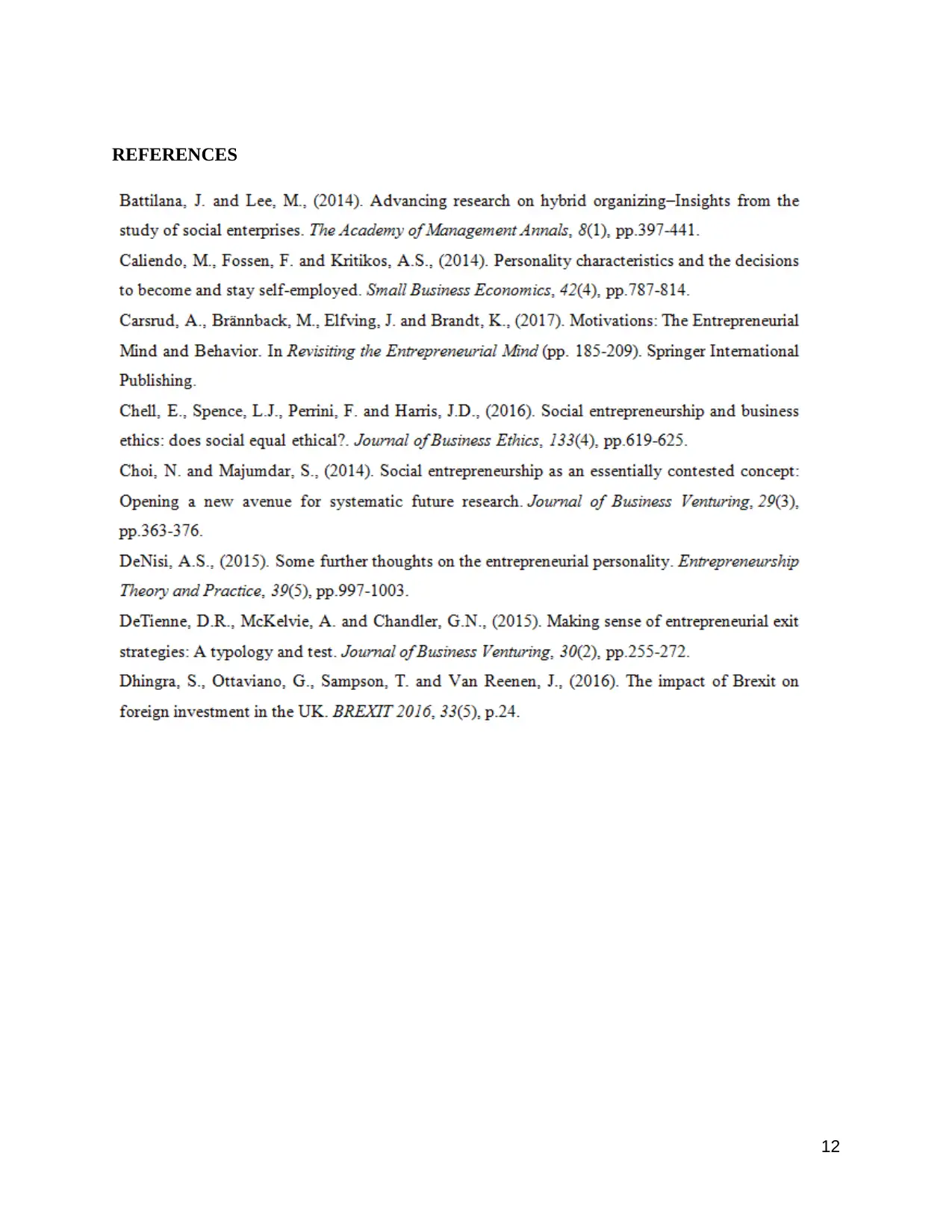
REFERENCES
12
12
⊘ This is a preview!⊘
Do you want full access?
Subscribe today to unlock all pages.

Trusted by 1+ million students worldwide
1 out of 17
Related Documents
Your All-in-One AI-Powered Toolkit for Academic Success.
+13062052269
info@desklib.com
Available 24*7 on WhatsApp / Email
![[object Object]](/_next/static/media/star-bottom.7253800d.svg)
Unlock your academic potential
Copyright © 2020–2025 A2Z Services. All Rights Reserved. Developed and managed by ZUCOL.





